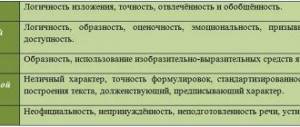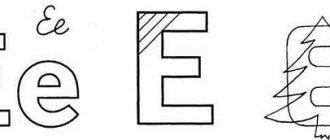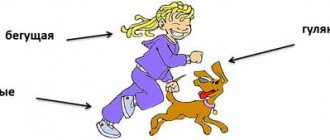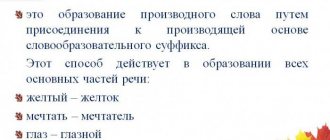so UNT / Lesson plans for the Russian language / Lesson plans for the Russian language 6th grade
LESSON 4. PARTS OF SPEECH
22.07.2013 20557 0
Lesson 4. Parts of speech
1. Working with the proposal.
The glok kuzdra shteko has sprouted the bokr and is curling the bokrenka.
- Analyze by members of the sentence. What parts of speech are they expressed by?
– How did the morphemes in these unusual words help you determine the part of speech?
– Why do you need to study morphemes?
2. About parts of speech.
– Today in class we will remember everything we know about parts of speech. For this purpose, our guest Know-It-All came to us. But the trouble is, he knows everything, but he’s very forgetful. Guys, help the guest fill in the missing places.
All words in the language are different, they differ from each other in appearance and behavior: it is these differences that Morphology, one of the countries of the United Kingdom Grammar, takes into account. In Morphology there live words of different “professions”, they have different tasks and abilities to perform them. At the same time, they live in Morphology, and “work” in the neighboring state - Syntax.
For example, the noun Sunny
, washed up, had breakfast and quickly ran to work, while
the sun was shining tenderly through the windows
.
In this sentence, the Sun
works ... (subject).
Each part of speech has a general grammatical meaning. The object is designated by... (nouns).
For example... The attribute of an object is indicated by... (adjectives).
For example... Action is indicated by... (verbs).
For example …
Each part of speech “owns” morphological characteristics. By numbers, gender and cases, two parts of speech change at once: ... and ... But conjugation, aspect and tense can only be determined for ...
Finally, going to work in a neighboring state, each part of speech prepares to fulfill its purpose: to “play” a syntactic role.
3. Exercise 18 (commented letter).
4. Exercise 19.
Option 1 – writes down nouns.
Option 2 – writes out adjectives and verbs.
5. Lesson summary.
1. Working with signal cards.
Each student has two cards: one is red, the other is green. The teacher pronounces theses. The students’ task is to determine the correctness of the thesis. If the thesis is correct, students raise a green card. If the thesis is incorrect, students raise a red card and justify their answer.
Abstracts:
1. An adjective denotes an object.
2. The verb denotes action.
3. Nouns serve to connect words in a sentence.
4. Independent parts of speech include a noun, adjective, verb, conjunction, and auxiliary parts include a preposition.
5. Adjectives and nouns have such unstable features as gender, number, and case.
6. The verb changes according to cases.
Homework:
exercise 20.
Summary of a Russian language lesson on the topic “Pronoun” (grade 6)
General lesson on the topic “Pronoun” in 6th grade
Goals:
educational
— generalization and systematization of knowledge on the topic “Pronoun”; broadening the horizons of students;
developing
— activation of independent activities; development of cognitive activity;
educational
- nurturing interest in the subject, love for the native language.
Planned results
:
personal
— interest in educational activities, a positive attitude towards oneself and others, increased self-esteem;
meta-subject
– the ability to competently construct an oral monologue statement; the ability to cooperate with the teacher and peers in accordance with the conditions and tasks of communication;
subject
– knowledge of grammatical features of pronouns; recognize pronouns in the text.
Lesson type:
lesson on summarizing the material learned
Equipment:
textbook, table “Digits of pronouns”, computer, projector and screen, handouts.
During the classes
Org. Moment
Teacher's word.
Dear Guys! You have come today to a Russian language lesson, where we will have to do something unusual! We need to run a marathon! Who knows what it is?
In athletics, the marathon distance is 42 km 195 m. The marathon got its name from the Greek village of Marathon, from which a warrior came running to Athens with the news of the victory over the Persians in the fifth century BC. e.But we have a rather unusual marathon - a linguistic marathon. The distance of our path consists of several segments, on each of which there is an obstacle, which can only be overcome by completing a linguistic task.
Determining the goals and objectives of the lesson
First, I would like to know the theme and purpose of our marathon. To do this, let's read the statement of the famous Russian linguist A.A. Reformatsky and try to determine what we have to do.
“This part of speech can change beyond recognition and may not change at all, it is always in a mask, always hiding its true face, but, despite such deceptiveness, even deceit, we cannot do without it for a day. We often don’t recognize her face, but we recognize ourselves in her” (A.A. Reformatsky)
-What part of speech is Reformatsky talking about? (about pronouns)
-How did you guess about this?
-What do we need to do to successfully run our marathon distance? (repeat the categories of pronouns, remember how pronouns change, consolidate the spelling of spellings)
So, before starting any competition, athletes need a warm-up.
Teacher: Now we will find out who remembered the ranks of pronouns better. 1. Pronouns indicating indefinite objects, characteristics, quantities? (Undefined). 2. A pronoun that does not have a nominative case? (Returnable). 3. Pronouns 1st, 2nd, 3rd person? (Personal). 4. Is there that much pronoun rank? (Indicative). 5. Pronouns that change like adjectives? (Possessive). 6. Pronouns containing a question? (Interrogative). 7. Pronouns that serve to connect simple sentences as part of a complex one? (Relative). 8. To what category do the pronouns belong: all, every, every, himself, most, different, any? (Definitives). 9. What are the names of pronouns used to deny any object or attribute? (Negative).




